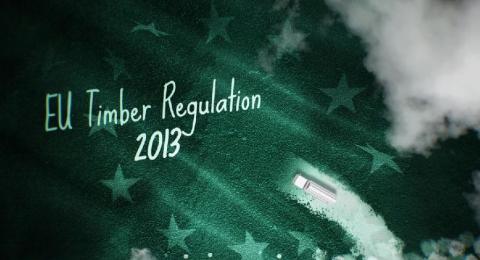Will the EU Timber Regulation be effective?
Tim Grabiel from the organisation of activist lawyers ClientEarth puts the EU Timber Regulation on trial: will it effectively exclude illegal timber from the EU marketplace? The answer rests in the detail where the interpretation of even a single word could be a determining factor
Within the next year, the details of the EU Timber Regulation will take shape, and stakeholders are holding their breath. Will it be workable? And will it be effective?
Key strengths: prohibition and due diligence system
We asked senior lawyer Tim Grabiel from the organisation of activist lawyers ClientEarth to present his thoughts on whether the EU regulation will fulfil its purpose. What is needed to close loopholes and utilise opportunities to create an effective legal instrument?
ClientEarth advocates for the Earth’s cause by lobbying to ensure effective implementation of various pieces of international environmental legislation. The organisation holds expertise in identifying weak spots in such legislation or in its enforcement.
Mr Grabiel: “Overall, this regulation has the potential to transform the industry. Its single strongest point is that it constitutes a clear prohibition on the placement of illegal wood products on the EU market. The requirement for operators to develop due diligence systems is also a great strength, provided the EU offers sufficient clarity on the requirements and that this is in line with the spirit of the regulation. Everyone is in agreement that we need more clarity on this point.”
Selection of "Monitoring Organisations" is crucial
According to Mr Grabiel, the weakest point is the uncertainty in the accreditation procedure of the Monitoring Organisations that are expected to hold an important control function under the regulation. The Monitoring Organisations will be responsible for assessing the quality of operators’ due diligence systems and delivering such systems – or at least their frameworks – to the operators they serve. Furthermore they will be appointed to conduct annual monitoring to verify that operators are following their approved due diligence systems.
“Society has a role to play in reviewing the Monitoring Organisations, which play a quasi-governmental role under the regulation”, says Mr. Grabiel. “It is enormously important that they fulfil the criteria. The assessment of applicant organisations should be transparent and the public should be directly involved, for example by setting up evaluation committees, including representatives of civil society organisations”.
What is “negligible risk”?
Another area of uncertainty is the risk identification requirement. “We need a lot more guidance from the Commission. It is possible to call upon existing methodologies for due diligence in other areas such as money laundering,” notes Mr Grabiel.
He also highlights the uncertainty surrounding the word ‘negligible’ where the EU regulation talks about ‘negligible risk’. EU requires importers and other ‘first placers’ to conduct a risk assessment of their supply chain.
For every identified risk, the operators need to define appropriate risk mitigation measures - except where the risk is deemed ‘negligible’.
“What does negligible mean in this context? Depending on how it is interpreted, it might be a potential loophole; operators may call an identified risk ‘negligible’ and then walk away. But the whole point of the regulation is to prohibit illegal wood from entering the EU market”, observes Mr. Grabiel.
Will proper documentation be required?
Mr. Grabiel highlights another potential weak spot that might undermine the intentions of the Regulation: the requirements for documentation collected under the operators’ due diligence system.
“There are those who advance the idea that the operators should only be required to have procedures in place for acquiring documentation – as opposed to actually keeping the relevant documentation”, explains Mr. Grabiel. “This interpretation weakens the text so much that it amounts to de facto re-writing the regulation. We would hate to see the requirements for a due diligence system reduced to solely procedural requirements. Operators should be asked to keep proper documentation. Ideally the system should be shipment-based.”
And with those words, we will let the case rest for the time being.
Tim Grabiel presented a vision for the implementation of the EU Timber Regulation at a well-attended session during the latest Chatham House Illegal Logging seminar. View Mr. Grabiel’s presentation
NEPCon is closely following the developments of the EU Timber Regulation, and is participating in the public consultation process. During the first stakeholder consultation held on 21 March 2011, the accreditation of monitoring organisations was discussed; however no clear conclusion has been reached at this point. The meeting was arranged by the European Forest Institute (EFI), which is contracted by the European Commission to carry out the stakeholder consultation process.
ClientEarth is an organisation of activist lawyers committed to securing a healthy planet, with offices in London, Brussels, and Warsaw. The organisation is backed by a diverse range of stakeholders. One of its recent declared supporters is the rock band Coldplay. For further information about ClientEarth’s activities on the EU Timber Regulation, contact Emily Unwin, Climate & Forest lawyer (eunwin@clientearth.org).



